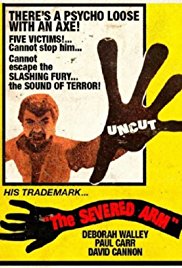 A zero budgeted early seventies gore fest that’s unremarkable in most respects (and downright inept in others) but has a curious resonance nonetheless. If nothing else, it’s proven quite influential in the intervening years.
A zero budgeted early seventies gore fest that’s unremarkable in most respects (and downright inept in others) but has a curious resonance nonetheless. If nothing else, it’s proven quite influential in the intervening years.
THE SEVERED ARM, about a shadowy figure picking off a group of men, was released in 1973, and can now, along with Mario Bava’s TWITCH OF THE DEATH NERVE (1971), be seen as an early prototype of the slasher films of the eighties. Frankly, there’s little else to be said for it, as it’s become quite dated in most respects (the gore quotient was initially considered high, but seems paltry by today’s standards), although I’m guessing it was probably never too impressive to begin with.
Incidentally, the most experienced cast member, the stocky, bespectacled, Brooklyn accented Marvin Kaplan, is best known as a comedian, and has appeared in films ranging from THE NUTTY PROFESSOR to IT’S A MAD MAD MAD MAD WORLD to WILD AT HEART. Regarding his appearance in THE SEVERED ARM, I hope he was well paid!
Jeff, a mild mannered working man, receives a suspicious package one day and opens it to find a severed arm. Shocked, he contacts an old friend and the two reminisce about an event that brought them and several companions together five years earlier: an exploration of a cave that became a life-and-death struggle when an avalanche trapped them all. Eventually it was decided that the only way to survive would be to amputate an arm and eat it; the unlucky donor turned out to be Ted, a meek man who vowed to get even with the others. They were rescued soon after and circulated a bogus story that Ted lost his arm in the cave-in.
Back in the present Jeff decides Ted has returned and is stalking the survivors of the cave-in. Jeff’s suspicions are confirmed when one of the group is attacked in his own house and has his left arm hacked off at the shoulder. Another, a disc jockey, gets de-armed in the radio station where he works. Jeff tries to get in touch with Ted but is unable to track him down; he does, however, manage to contact the latter’s grown daughter. She’s initially hesitant about divulging any information about her father, but apparently has a change of heart after Jeff takes her to visit one of his armless friends in a hospital. She reveals that her father has gone over the deep end in recent years and is indeed hell-bent on tracking down and mutilating those responsible for amputating his arm.
Another arm chopping follows, this time in an elevator, and Jeff receives an ominous summons to a seaside cliff where Ted is apparently planning a final showdown. When Jeff arrives there, however, quite a few revelations are in store: it seems that Ted’s daughter, together with his (thus far unseen) son, has been responsible for the madness, and has a final surprise in store for Jeff involving a dungeon and a sharp scalpel…
This film is as scuzzy as can be imagined, with ultra-low rent lighting, tacky film stock and sub par performances. Also, director Thomas Alderman overuses his electronic score to—and beyond—the point of annoyance. Nevertheless, in the manner of many early seventies productions, the film’s low budget frequently works in its favor, giving it an appropriately hard-edged, unvarnished feel. The lighting, which seems to have been accomplished with a single key light in every scene (no fill or backlighting), is stark and shadowy in a way that actually enhances the horrific feel of the piece. Some of the killings are done with flair (most notably the one in the radio station) and the whole thing rises to a memorable (though perhaps unintentional) pitch of psychotic hysteria in the final scenes.
One wonders if John Carpenter viewed THE SEVERED ARM before making HALLOWEEN. Comparing the two would be giving the present film far too much credit, but it does make for a fitting precursor to that and other subsequent genre classics.
Vital Statistics
THE SEVERED ARM
Media Trend
Director: Thomas S. Alderman
Producer: Gary Alderman
Screenplay: Thomas S. Alderman, Larry Alexander, Daryl Presnell
Cinematography: Bob Maxwell
Editing: Sonny Klein, Joe Ravetz
Cast: Deborah Walley, Paul Carr, David G. Cannon, Marvin Kaplan, John Crawford, Vince Martorano, Ray Dannis, Wally K. Berns, Bob Guthrie, Cynthia Gabrielle, George Dunn, Alan DeWitt, R. Lance Thomas, Gwen Cannon
